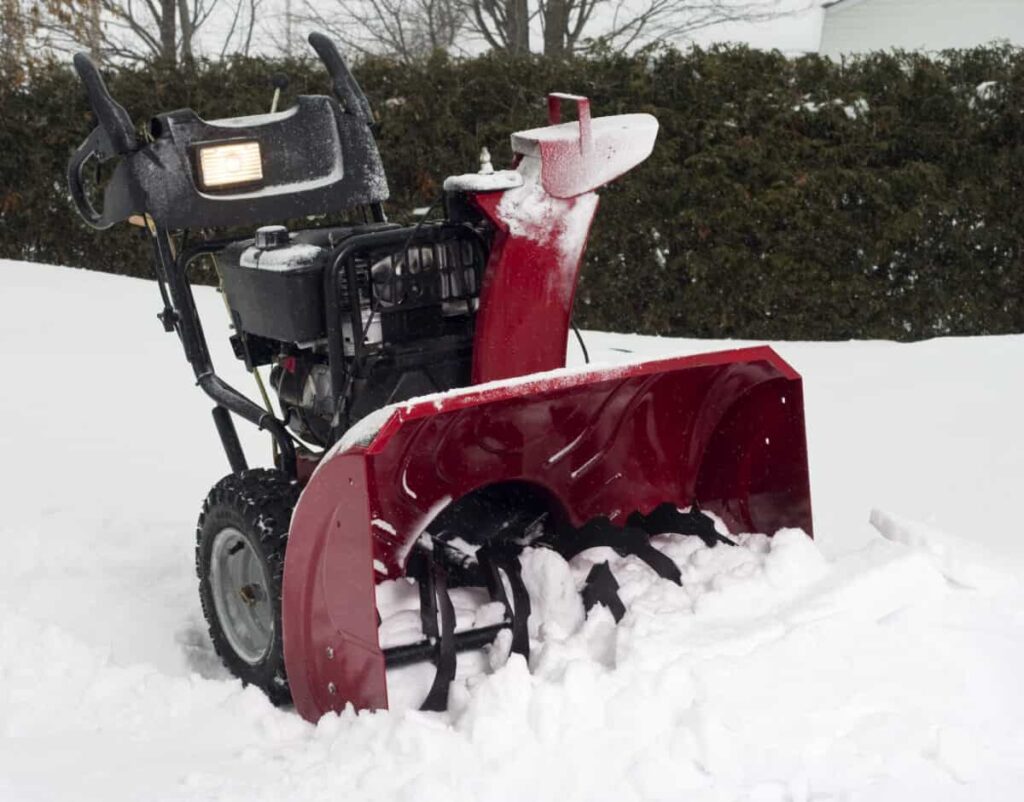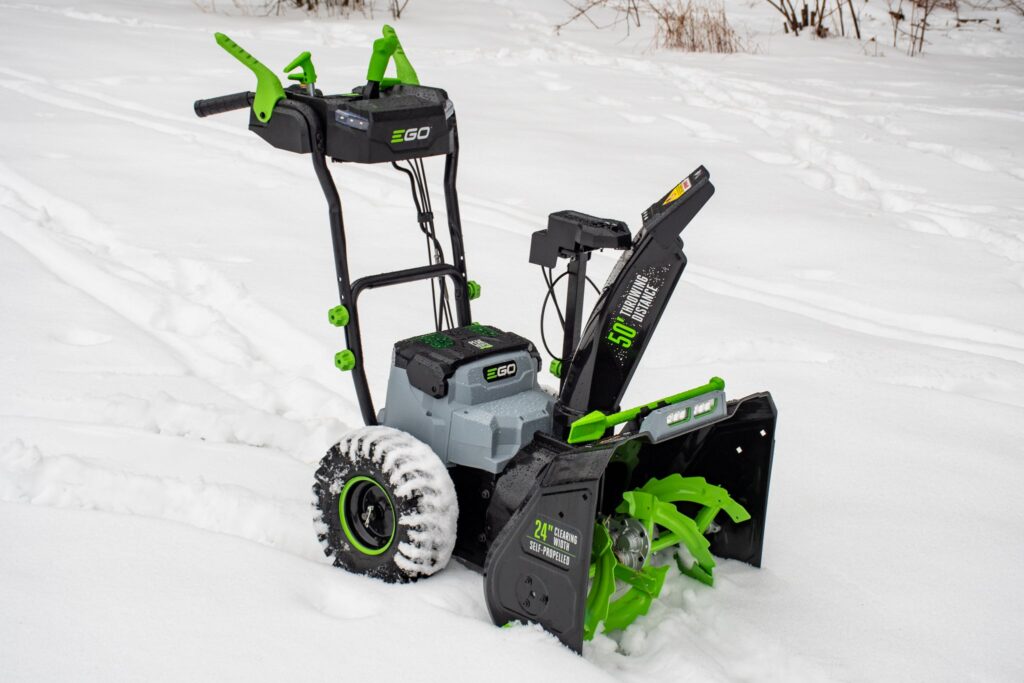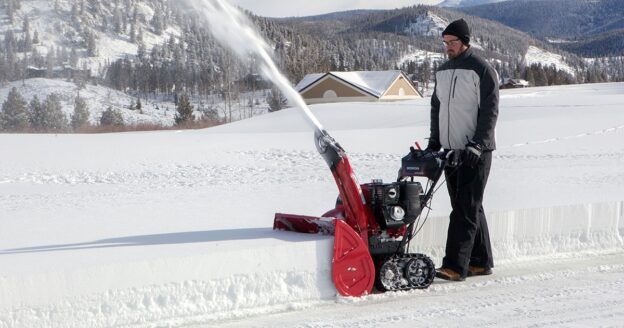Are you tired of spending hours shoveling snow every winter? If so, you might be wondering if investing in a snowblower is worth it. In this article, we will explore the benefits of owning a snowblower and help you make an informed decision. Say goodbye to back-breaking labor and hello to a more efficient and convenient way of clearing snow from your driveway and walkways. Let’s find out if a snowblower is the winter tool you’ve been missing!
Factors to Consider
Amount of Snowfall
The amount of snowfall in your area is a crucial factor to consider when deciding whether or not to invest in a snowblower. If you live in an area that experiences heavy snowfall each winter, a snowblower can be a valuable tool to have. It will help you efficiently and effectively remove snow from your property, ensuring that you have a clear pathway and driveway. On the other hand, if you live in an area where snowfall is minimal, a snowblower may not be necessary and alternative methods like shoveling may be more practical.
Property Size
The size of your property is another important factor to consider when determining whether or not to purchase a snowblower. If you have a large property, manually shoveling snow can be time-consuming and physically demanding. In these cases, a snowblower can be a game-changer. It will significantly reduce the time and effort required to clear your property, allowing you to get back indoors to warmth and comfort much quicker.
Physical Health
Your physical health also plays a significant role in deciding if a snowblower is worth investing in. Shoveling heavy snow can be physically demanding and may not be suitable for individuals with back or joint problems or respiratory conditions. In such cases, a snowblower can be a safer alternative that minimizes the risk of injury or strain. It takes the burden off your body, allowing you to clear snow without putting excessive stress on your muscles and joints.
Budget
Budget is always an important consideration when making any purchase, and this is no different when it comes to snowblowers. Snowblowers can vary significantly in price depending on their size, power source, and features. While they can be a significant investment initially, they can also provide long-term cost savings compared to hiring snow removal services. It is essential to assess your budget and determine how much you are willing to spend on a snowblower before making a decision.
Local Snow Removal Services
Another factor to consider is the availability and cost of local snow removal services. If you live in an area where professional snow removal services are readily available and affordable, you may decide that it is not worth investing in a snowblower. However, it’s important to keep in mind that relying solely on snow removal services can have its drawbacks. You may have to wait for the service provider to clear your property, which can be inconvenient during emergencies or if you have a busy schedule. Additionally, recurring costs can add up over time, making owning a snowblower a more cost-effective option.
Advantages of Having a Snowblower
Efficient Snow Removal
One of the most significant advantages of having a snowblower is its efficiency in snow removal. Snowblowers are specifically designed to remove snow quickly and effectively, making the task much easier and faster compared to manual shoveling. With the powerful rotation of their augers or impellers, snowblowers can throw snow much farther than what is achievable with a shovel, allowing you to clear a larger area in less time.
Saves Time and Energy
Owning a snowblower can save you a significant amount of time and energy. Instead of spending hours out in the cold, manually shoveling snow, a snowblower can quickly clear your property. This time-saving benefit is especially valuable if you have a busy schedule or need to clear snow early in the morning before heading to work. Moreover, a snowblower requires less physical effort compared to shoveling, making it a more comfortable and efficient option.
Easier on the Body
Snow removal can be physically demanding, especially when dealing with heavy snowfall. Shoveling snow can strain your back, shoulders, and joints, leading to injuries or exacerbating existing conditions. Using a snowblower significantly reduces the amount of physical effort required, minimizing the risk of strain or injury. This is particularly beneficial for individuals with physical limitations or health conditions that make shoveling unsafe.
Convenience in Emergency Situations
Snowstorms can sometimes leave us stranded in our homes, unable to go about our daily activities until the snow is cleared. Having a snowblower can provide convenience during emergency situations, allowing you to quickly clear snow and access your vehicles, pathways, and other outdoor areas. In case of medical emergencies or urgent situations where timely access is crucial, a snowblower can be a lifesaver.
Cost Savings in the Long Run
Although the initial cost of purchasing a snowblower can be relatively high, owning one can result in long-term cost savings. Hiring professional snow removal services for the entire winter season can quickly add up, making the cost of a snowblower a more economical choice in the long run. Additionally, a snowblower allows you to take control of your snow removal needs, eliminating the recurring costs associated with outsourcing the task.

This image is property of singlegirlsdiy.com.
Disadvantages of Having a Snowblower
High Initial Cost
One of the main disadvantages of owning a snowblower is the high initial cost. Snowblowers can range in price, with higher-end models often carrying a significant price tag. If you are on a tight budget or do not anticipate heavy snowfall in your area, the initial cost may make it difficult to justify purchasing a snowblower.
Maintenance and Repairs
Like any other mechanical device, snowblowers require regular maintenance and occasional repairs. This includes tasks such as changing oil, inspecting belts and shear pins, and cleaning or replacing spark plugs. Failure to properly maintain your snowblower can lead to decreased performance or more significant issues in the long run. It’s important to factor in the cost and time required for these maintenance tasks when considering whether or not to invest in a snowblower.
Storage Space Required
Snowblowers can be large and bulky, requiring adequate storage space when not in use. This can be a challenge for individuals with limited storage space or those living in apartments or condominiums. It’s important to assess your available storage options before purchasing a snowblower to ensure that you have a suitable place to keep it when it’s not in use.
Noise and Environmental Impact
Snowblowers can be quite noisy, which may be a concern if you have close neighbors or live in a noise-restricted area. While some snowblowers come with noise reduction features, they can still generate a significant amount of noise during operation. Additionally, gas-powered snowblowers emit fumes that contribute to air pollution. If noise or environmental impact is a significant concern for you, an electric snowblower may be a more suitable alternative.
Limited Use in Light Snowfalls
Snowblowers are designed to handle heavy snowfalls efficiently. However, they may not be as effective or practical for light snowfalls. In such cases, manual shoveling or alternative snow removal methods may be more suitable and efficient. If you live in an area with infrequent heavy snowfall, owning a snowblower may not be the most cost-effective option.
Types of Snowblowers
Single-Stage Snowblowers
Single-stage snowblowers are entry-level snow removal machines that are suitable for lighter snowfalls and smaller areas. They are typically equipped with a single auger that both scoops and throws the snow. While they are typically less expensive than other types of snowblowers, they may lack the power necessary to handle heavy or wet snow effectively.
Two-Stage Snowblowers
Two-stage snowblowers consist of an auger that scoops the snow and a separate impeller that throws the snow. This two-stage process allows them to handle heavier and more compacted snow with greater ease. Two-stage snowblowers are generally more powerful and have larger clearing widths, making them suitable for larger areas and heavier snowfall.
Three-Stage Snowblowers
Three-stage snowblowers are the most powerful and efficient option available. They feature an additional accelerator that moves snow into the impeller more quickly, resulting in faster and more effective snow removal. Three-stage snowblowers are ideal for areas with extremely heavy snowfall or for commercial use.
Electric Snowblowers
Electric snowblowers are powered by electricity and are typically lighter and quieter than gas-powered models. They require an electrical outlet or a rechargeable battery and are best suited for smaller areas with lighter snowfall. Electric snowblowers are generally easier to maintain and operate, but they may not have the same level of power as gas-powered models.
Gas-Powered Snowblowers
Gas-powered snowblowers are typically more powerful than electric models, making them suitable for larger areas and heavier snowfall. They are also more versatile as they do not require an electrical outlet, allowing you to use them anywhere. However, gas-powered snowblowers require regular maintenance and may emit fumes, making them less environmentally friendly than electric models.

This image is property of www.snowblowersdirect.com.
Cost Considerations
Initial Purchase Price
The initial purchase price of a snowblower can vary significantly depending on its size, power source, and features. Electric snowblowers are generally more affordable than gas-powered models, while larger and more powerful snowblowers tend to have a higher price tag. It’s important to determine your budget and assess your snow removal needs to find a snowblower that offers the best value for your money.
Operating Costs
In addition to the initial purchase price, it’s essential to consider the ongoing operating costs of a snowblower. Gas-powered snowblowers, for example, require fuel, oil, and other maintenance supplies, which can add up over time. On the other hand, electric snowblowers are generally more cost-effective to operate, requiring only electricity or battery charging. Understanding the long-term operating costs will allow you to make an informed decision about the most economical choice for your needs.
Maintenance and Repair Costs
Regular maintenance is essential to keep your snowblower in optimal condition and ensure its longevity. This includes tasks such as oil changes, belt replacements, and spark plug cleaning or replacement. It’s important to factor in the cost and time required for regular maintenance when considering the overall cost of owning a snowblower. Additionally, occasional repairs may be necessary, especially if the snowblower is used heavily or not adequately maintained. Being prepared for these potential costs will help you make an informed decision about whether or not a snowblower is within your budget.
Alternatives to Snowblowers
Shoveling
Shoveling snow manually is the traditional method of snow removal and can be a suitable alternative to a snowblower in certain situations. Manual shoveling is cost-free, provides a good workout, and can allow you to enjoy the fresh air and physical activity. However, it can be time-consuming, physically demanding, and may not be suitable for individuals with health conditions or significant snowfall.
Hiring a Snow Removal Service
For individuals who do not wish to invest in a snowblower or deal with snow removal themselves, hiring a professional snow removal service is a viable option. Snow removal services have the equipment and expertise to handle snow removal efficiently and effectively. However, they come at a recurring cost and may not provide instant service, especially during peak snowfall periods or emergencies.
Using a Snow Plow Attachment
If you already own a suitable vehicle, attaching a snow plow can be a practical alternative to a snowblower. Snow plow attachments can be installed on trucks or SUVs and allow you to clear snow from your driveway or other areas. This option offers convenience, especially if you already need a vehicle for transportation. However, it may not be as efficient or effective as a snowblower, especially in heavy snowfall or for clearing larger areas.

This image is property of thriftdiving.com.
Climate Factors
Average Snowfall Amount
The average snowfall amount in your area is a significant climate factor to consider when deciding whether or not to invest in a snowblower. If your region experiences frequent and heavy snowfall, a snowblower can be a valuable tool to have. However, if your area receives minimal snowfall, a snowblower may not be necessary, and alternative snow removal methods may be more practical.
Frequency of Heavy Snowfalls
Another climate factor to consider is the frequency of heavy snowfalls. If your area frequently experiences heavy snowstorms, a snowblower can be a lifesaver. It will allow you to quickly and efficiently remove snow, ensuring that your property is clear and accessible. However, if heavy snowfalls are rare in your region, the investment in a snowblower may not be as justified.
Snowfall Patterns
Understanding the snowfall patterns in your area can also help in determining the need for a snowblower. If your region typically experiences light and fluffy snowfall, manual shoveling may be sufficient most of the time. However, if your area experiences heavy and wet snow, a snowblower can be a beneficial tool to have. Understanding the type of snowfall your area receives will allow you to choose the most suitable snow removal method.
Personal Physical Health
Strength and Endurance
Your physical strength and endurance are important factors to consider when deciding whether or not to invest in a snowblower. Shoveling heavy and wet snow can be physically demanding, requiring significant upper body strength and endurance. If you have physical limitations or are unable to shovel for extended periods, a snowblower can be a suitable alternative that minimizes the risk of injury or strain.
Back and Joint Problems
Individuals with back or joint problems should carefully consider the physical demands of shoveling before deciding whether or not to purchase a snowblower. Shoveling heavy snow can strain your back, shoulders, and joints, potentially exacerbating existing conditions or causing injuries. If you have back or joint problems, a snowblower can be a safer option that significantly reduces the physical effort required.
Respiratory Conditions
Individuals with respiratory conditions should also evaluate the potential impact of shoveling on their health before deciding whether to invest in a snowblower. Shoveling snow can be physically demanding and may cause shortness of breath and respiratory discomfort. If you have respiratory conditions such as asthma or chronic obstructive pulmonary disease (COPD), a snowblower can be a more suitable option that minimizes the risk of respiratory distress.

This image is property of cdn.thewirecutter.com.
Financial Considerations
Budget for Purchase
Your budget for purchasing a snowblower is a crucial financial consideration. Snowblowers can vary significantly in price, depending on their size, power source, and features. Therefore, it’s important to determine how much you are willing to spend on a snowblower before making a decision. Evaluating your budget will help you find the most suitable snowblower that offers the best value for your money.
Cost of Maintenance and Repairs
In addition to the initial purchase price, it’s essential to consider the ongoing cost of maintaining and repairing a snowblower. Regular maintenance tasks and occasional repairs can add up over time. It’s important to factor in these costs when determining whether owning a snowblower is within your budget. Evaluating the anticipated maintenance and repair costs will allow you to make an informed financial decision.
Comparative Cost of Snow Removal Services
Comparing the cost of owning a snowblower versus hiring professional snow removal services is another financial consideration. While the initial cost of a snowblower can be significant, it may offer long-term cost savings compared to recurring costs associated with outsourcing snow removal. By assessing the comparative cost of snow removal services in your area, you can determine whether owning a snowblower is a more financially advantageous choice.
Conclusion
Deciding whether or not it is worth getting a snowblower requires careful consideration of various factors. The amount of snowfall, size of your property, physical health, budget, and availability of local snow removal services are all crucial considerations. While snowblowers offer advantages such as efficient snow removal, time and energy savings, and convenience, certain disadvantages like high initial costs, maintenance requirements, and limited use in light snowfalls should also be considered. Assessing climate factors, personal physical health, and financial considerations will allow you to make an informed decision about whether owning a snowblower is the right choice for you. Ultimately, the decision should be based on your specific needs and circumstances.

This image is property of www.thespruce.com.
